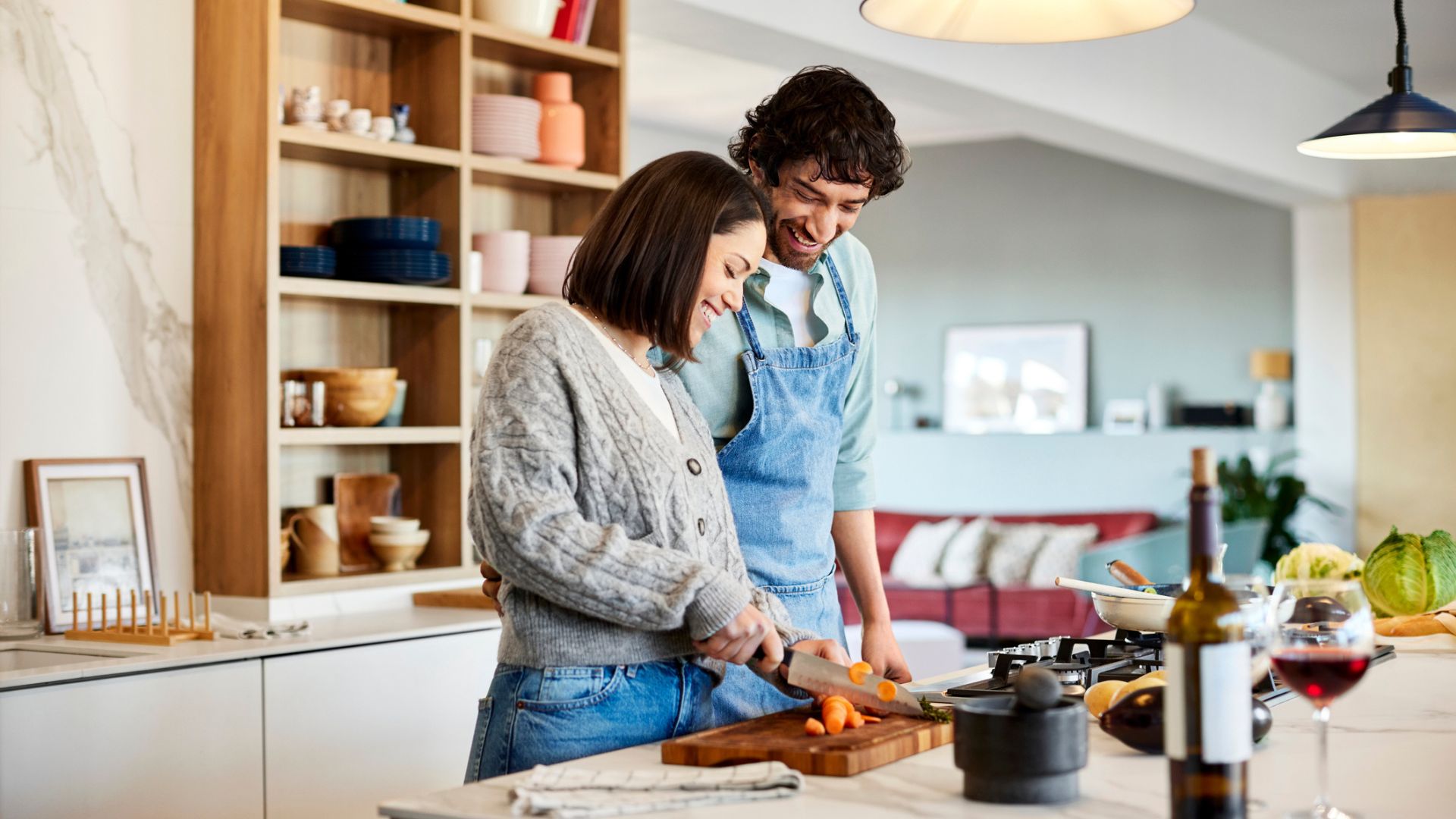How to revive romance in a relationship when you’ve been together for a long time
Looking to revive the romance in a relationship? Therapists reveal the ways to do it

You'll know it takes work to keep the romance in a relationship alive if you've been with your partner for a long time. It can be so easy to get swept along with the daily slog of work or family life and forget about each other. Conversations might focus on children or other practicalities and precious time alone together might be hard to schedule.
I’ve been with my husband for 20 years - with 10 years of marriage this year - and it’s safe to say that in this time we’ve weathered some amazing highs and the lowest of lows. But when dealing with these shocks and surprises (twins!), the one thing that has remained the same is the bedrock our relationship is based on. I don’t think we could have gotten through some of it if it hadn’t been rock solid.
I wouldn’t change a thing but ‘safe’ does sometimes feel quite boring and in recent years the romance levels in our relationship have dipped. As I type this, I’m sitting in a cafe opposite a couple who keep kissing every two or three minutes. They’re clearly very in love and at the stage where they can’t keep their hands off each other. This time in my relationship feels like a lifetime ago. Seeing them makes me feel a bit uncomfortable - or am I jealous?
I’m not saying I want to go back to the start again but I do think my husband and I need to set aside more time to focus on us as a couple and move away from being just parents. But of course, life gets in the way. So, to discover exactly how to revive romance in a relationship, avoid relationship burnout, and learn how to spice things up in the bedroom, I've spoken to several sex and relationship therapists.
What is romance in a relationship?
Romance in a relationship obviously looks different for different couples and constantly evolves as we age and change as people. Alison Blackler, a mind coach and certified counselor, tells me the heady early days are driven by chemicals such as the love hormone oxytocin and dopamine, which are released when you’re attracted to someone. Blackler says at the start of a relationship “we are focused on making a good impression and are often ‘on our best behavior’”. As you become more comfortable and secure in the relationship, you might start to let things go, whether this is peeing with the door open or keeping your socks on during sex.
And speaking of sex, is it important to have sex when you’ve been together a long time? This isn’t really a question that can be answered with a ‘yes’ or ‘no’. A couple who have sex once or twice a month isn’t any less in love or less romantic than a couple who do it a few times a week. But if things feel stale, looking at your sex life can be a good place to start.
Counselor Emma Roberts, who supports parents with her business Dear Mama, says it’s important to remember that all relationships have highs and lows. “No relationship is perfect and it’s only normal that relationships can go through rough patches, it’s all about your motivation to be in the relationship and if it’s working for you."
Sign up to our free daily email for the latest royal and entertainment news, interesting opinion, expert advice on styling and beauty trends, and no-nonsense guides to the health and wellness questions you want answered.
If you’ve been together for a long time, the spark I saw between the couple in the cafe may have faded to more of a fizzle. It can become easy to take each other for granted and to put other family members or work ahead of your partner.

How to revive romance in a relationship
1. Make each other feel wanted
What makes your partner tick? How do they like to give and receive love? If they’re very tactile, perhaps they need kisses, hugs, and more, to feel loved. They might like to hear words of affirmation that they’re wanted. Quality time together, gifts, or surprises might also be what your partner considers romantic and important in a relationship.
It can take time to learn what your partner's love languages are but once you do, it means you can anticipate their needs before they’ve verbalized them. This should help you avoid conflict and issues with miscommunication.
Licensed couples therapist Kendra Capalbo says, “If you want to feel wanted, make your partner feel wanted. All sorts of cycles exist in relationships, and we can’t always wait for our partner to shift."
She says, "Too often we are focused on what our partner is or isn't doing that's impacting the amount of romance in our relationship. Instead, focus on being the one to suggest a date night, a new sex position, or a weekend away. It's a way to reverse a negative energy loop and create instead one of positive connection,” adds Capalbo, who is also the founder of Esclusiva Couples Retreats.
2. Put down your phones
We all know mobile phones and social media have become parts of everyday life that stop us from communicating face-to-face and it’s very easy to fall into this habit with your partner. My husband and I are very guilty of sitting on the sofa in the evenings and staring at our phones instead of actually asking about each other’s days or discussing important issues.
Relationship coach and accredited energy alignment mentor Ceza Ouzounian says, “We are so busy with our phones that sometimes we don't give our partners our full attention." Instead of scrolling aimlessly through Instagram in the evening, she suggests having romantic meals at the table, with no phones and a proper conversation.
Blackler also believes it's important to make time to talk, so if it's not happening then it should be one of the deal breakers in a relationship going forward. "If either person in the relationship feels it's gone stale, ignoring or avoiding it will lead to more challenges. If feelings aren't shared, it's likely to come out in criticism, blame, or arguments and this is likely to build up resentment and dissatisfaction."
3. Daytime dates
Life with three boys aged six and under is quite exhausting for me most of the time. My husband works long hours and sometimes we can go through a day without actually speaking directly to each other. In recent years, we’ve started trying to book days off during the week together, when our children are at school and pre-school. This works better than an evening date because we’re less tired, have more time, and can plan more exciting activities. We might visit an exhibition or museum we’ve wanted to go to, or go for a walk and then have a long lunch. Planning one of these every couple of months gives us something to look forward to and makes a lovely change to the work and parenting juggle.
The more time we spend alone together, the more we realize how much we love being together. We always try to make sure we have the next date planned so other things can’t take priority.

4. Switch up the sex
One of the most obvious ways for most people of connecting and increasing the romance factor is by having sex. A study by the University of Fribourg in Switzerland found that “positive interpersonal interactions are central to wellbeing” and that sex “promotes wellbeing and has long-term relational benefits”. Like the couple I saw in the cafe, you and your partner may not have been able to keep your hands off each other in the early years, but priorities and sexual appetites change. It can be easy for sex to feel routine, and even functional, when you’ve been together a long time.
Talk to your partner about trying some new sex positions, experimenting with sex toys, or trying one of the best sex games. The endorphins and oxytocin released will increase your feelings of intimacy and happiness.
Mangala Holland, a women’s empowerment and sexuality coach, says, “The good news is that intimacy can definitely get better in long-term relationships. Many of my clients have been with their partners for 20 to 35 years, and with the right communication, sex just gets better and better because there's such a good foundation of trust and respect, and they can become really attuned to each others' pleasure.”
5. Keep your individual identities
When you have been part of a couple for a long time, it can be easy to lose your sense of self. This can lead to a build-up of resentment, which could be one of the signs your relationship is over, according to the experts. I know I have often felt this when life feels full of small children and little sleep. It’s taken a while but my husband and I have learned to pick up on the cues for when we each need some space. This may not sound romantic, but having the opportunity to spend a day with friends or go away for a few nights makes me love him even more. And of course, absence, even for one or two days, makes the heart grow fonder.
Ouzounian also has a good suggestion: “Find your own hobby you do alone. This gives you the chance to spend time away from your partner and do something fun just for yourself. When you go home, you have something to talk about and feel good as you've done something for yourself.”
6. Find a shared interest
As much as it’s important to have some alone time to do the things you enjoy, a long-term relationship can also benefit from finding a hobby you both enjoy doing together. This doesn’t have to be something time-consuming or expensive. It could be going to the cinema once a month, seeing live music, or going swimming. Spending more time together will only make you feel closer and strengthen your partnership.
A study by the University of Minnesota, for instance, found that couples who did activities together had a greater feeling of “wellbeing (more happiness, more meaningfulness, and less stress)” compared to when they did activities apart.

7. Take a break from the daily grind
This one isn’t as easy as some of the other tips but it could be one of the most romantic suggestions. A weekend away or longer holiday alone together is the perfect opportunity to bond with your partner with no distractions.
A break from the day-to-day routine will give you both a chance to relax and concentrate on each other. It may remind you of the early months and years of your relationship which will bring you closer together, and it may also give you the chance to be more experimental with sex as you’ll feel more energized. If you're looking to build intimacy in your relationship, spending time together alone and away from the hustle and bustle of normal life is a great idea.
8. Remember why you fell in love
If you and your partner have been together for a long time, are still in love, and you're happy - if not always romantic - then the pair of you are clearly a good match. Whatever first attracted you to each other will still be present, it might just need resurrecting once in a while.
“Act like you just met and you are getting all those butterflies you get when you first start dating. Remember why you fell in love and tune into those qualities about each other," Ouzounian says.
Telling each other what you love about them can be really romantic and is famously one of the best confidence boosters. As Holland says, “Essentially most people want to be desired and treated like we were when we first met our partners. If date night, compliments, and expressing your appreciation have fallen by the wayside, creating new habits around these will really help our partners to feel valued.”
My husband and I might have two decades under our belts, and we've been through a lot in those years, but I know we’ll need to carry on putting the work in to make sure we’ve got plenty more years of romance and happiness ahead of us.

Kat Storr has been a digital journalist for over 15 years after starting her career at Sky News, where she covered everything from world events to royal babies and celebrity deaths. After going freelance eight years ago, she now focuses on women's health and fitness content, writing across a range of UK publications.
From perimenopause to the latest fitness trends, Kat loves researching and writing about it all. She's happy to give any fitness challenge a go and speaks to experts about wellbeing issues affecting people every day.
